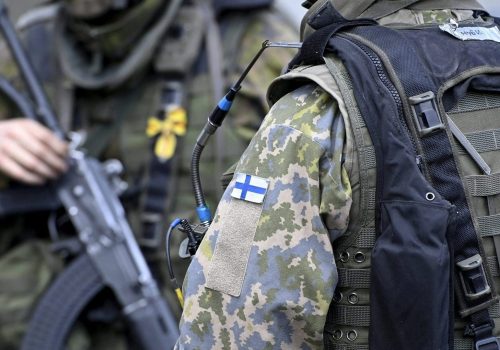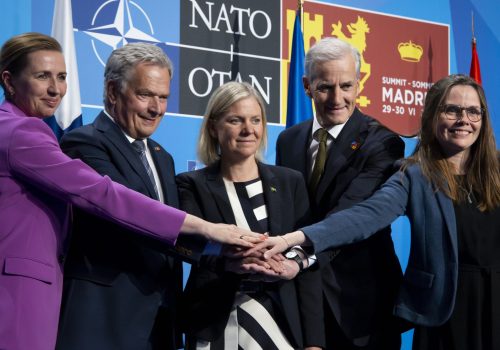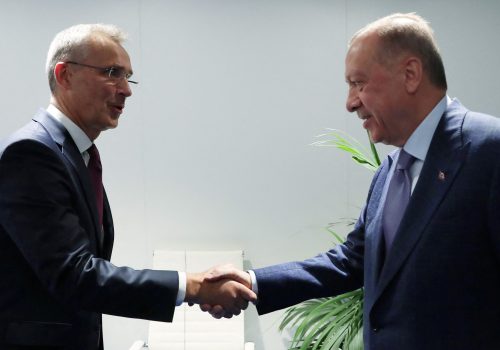The Senate emphatically backs NATO expansion. What’s next?
JUST IN
It was a landslide. With a tally of 95-1, the US Senate voted on Wednesday to ratify an amended NATO treaty adding Sweden and Finland to the Alliance. The bipartisan blowout means that twenty-three of the thirty allies have now approved the expansion inspired by Russia’s invasion of Ukraine. What political hurdles remain and what will Brussels, Helsinki, and Stockholm be up to in the meantime? Our NATOlogists break down the big news.
TODAY’S EXPERT REACTION COURTESY OF
- Chris Skaluba: Director of the Scowcroft Center’s Transatlantic Security Initiative and former principal director for European and NATO Policy at the US Defense Department
- Leah Scheunemann: Deputy director of the Transatlantic Security Initiative and former US Senate staffer and Pentagon official focused on international security policy
Behind the bipartisanship
- Wednesday’s vote, in which Missouri Republican Josh Hawley was the lone “no,” is “an incredible signal of bipartisan unity at a moment where bipartisan unity is in short supply,” Chris says.
- And that outcome wasn’t “a foregone conclusion,” he adds: “My inboxes are littered with messages from past months where serious people both at home and abroad wondered whether the US Senate could muster the two-thirds majority it needed to ratify Finland and Sweden’s accession.”
- The huge result was hard-fought. Chris notes that behind the scenes, Sweden, Finland, and the Biden administration “made serious, good-faith efforts” to educate members of Congress, their staffers, and the public “and to answer concerns about how much US support would be required to offer Finland and Sweden Article 5 protection” under the Alliance’s collective-defense agreement.
- Policy arguments only go so far, though. “It certainly didn’t hurt that for many senators, a ‘yea’ vote constituted a thumb in the eye of the Kremlin,” Chris adds.
Subscribe to Fast Thinking email alerts
Sign up to receive rapid insight in your inbox from Atlantic Council experts on global events as they unfold.

Politics stops at the water’s edge?
- Stepping back, Chris notes that both parties in Congress have long backed the Alliance—including “keeping the US anchored in NATO during the turbulent Donald Trump years.”
- And more recently Capitol Hill has been reasserting its role abroad, after largely ceding that ground to the executive branch, Chris tells us: “From last year’s outrage about the US withdrawal from Afghanistan, to this year’s support for Ukraine, to this week’s trip by Speaker Pelosi to Taiwan, to today’s vote, there is a trend of the Congress taking on greater responsibility for US foreign policy and doing so in a way that is largely aligned across the aisle. Given our broader political divisions, it’s a notable development.”
The final countdown
- By holding the vote just before its August recess, the Senate sets up the rest of the Alliance to seal the deal in the coming weeks, signaling to allies who have yet to vote on the Finnish and Swedish membership bids “that the US is fully supportive” of this expansion, Leah says.
- The countries that have yet to ratify the amended treaty are the Czech Republic, Greece, Hungary, Portugal, Slovakia, Spain, and Turkey—the most reluctant country on the list, which recently held out the prospect of not ratifying the deal if Sweden does not extradite dozens of people whom Ankara considers terrorism suspects.
- While the political machinations continue from Ankara to Athens to Prague, military leaders are hard at work preparing to welcome two sophisticated militaries into the Alliance and make sure they “are integrated, ready, and effective to maximize deterrence of Russia,” Leah tells us.
- The Alliance is mobilizing to defend Swedish and Finnish territory, while setting priorities for the two countries’ military investments, “which should prioritize readiness and interoperability with NATO forces,” Leah says. Expect to see the new members “potentially hosting NATO forces for exercises, contributing to more Alliance exercises, and supporting NATO’s forward forces in the Baltics with their own national troops and capabilities,” she adds.
Further reading
Mon, Aug 22, 2022
Sweden and Finland are on their way to NATO membership. Here’s what needs to happen next.
Issue Brief By John R. Deni
In response to Russia's unprovoked invasion of Ukraine, Finland and Sweden took the historic step of applying to join NATO. Both nations will bring modern capabilities that will help defend against malign actors. As Finland and Sweden's membership is forthcoming, Alliance leaders, NATO watchers, and transatlantic security experts need to consider how to fully integrate the new allies, include them in operational plans, and best enhance defense of a longer border with Russia.
Mon, Aug 1, 2022
An urgent message to our fellow senators: Support Finland and Sweden’s swift accession into NATO
New Atlanticist By
Our Senate colleagues should stand resolute in support of the Alliance, our rules-based order, and liberal democracies worldwide.
Tue, Jun 28, 2022
What Turkey won with its NATO leverage
Fast Thinking By
Ankara got exactly what it wanted in exchange for paving the way for Sweden and Finland to join the Alliance.
Image: FILE PHOTO: Sweden's Foreign Minister Ann Linde and Finland's Foreign Minister Pekka Haavisto attend a news conference with NATO Secretary General Jens Stoltenberg, after signing their countries' accession protocols at the alliance's headquarters in Brussels, Belgium July 5, 2022. REUTERS/Yves Herman/File Photo


